Israeli society in mortal danger if citizens can’t find a way to compromise over judiciary
Secular Jews are fighting back, in their hundreds and thousands, as the ultra-Orthodox grow in number and power – but the breakdown of opposing parties’ ability to compromise threatens a tragedy for their democracy.
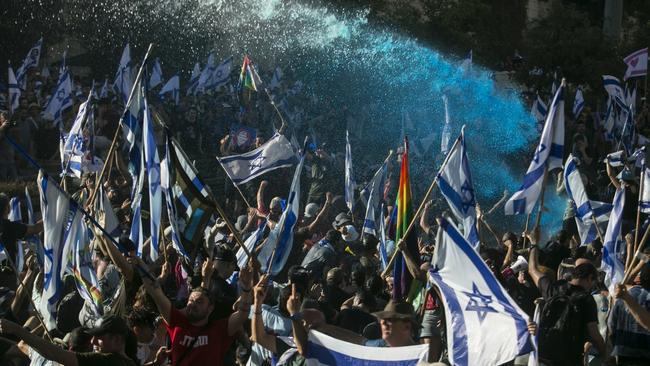
Benjamin Netanyahu’s right-wing coalition government passed legislation to reform one of Israel’s Basic Laws, as near as Israel comes to a constitutional text, to remove the Supreme Court’s ability to strike down government decisions on the basis that they are “unreasonable”. This was a key demand of a couple of the parties that made his government possible.
The most liberal parts of Israeli society hate the reform, believing it fundamentally erodes the rule of law, and have taken to the streets in their hundreds of thousands to oppose it. Thousands of Israeli military reservists say they won’t report for duty if the law stands.
Military commanders warn Israel’s military preparedness is at risk. International ratings agencies have downgraded Israel. Big firms are advising investors to hold off. The leaders of Iran and Hezbollah, Israel’s most determined enemies, publicly rejoice.
There are no heroes in this and no absolute villains. There are good arguments for and against every proposed reform. What is tragic is the mutual demonisation of the parties, the breakdown of the willingness to lose an argument, which underlies democracy.
I don’t believe Israel stands on the brink of civil war but it does stand in the middle potentially of society-wide civil disobedience. Two sides of an intensely polarised polity will not shoot at each other but they won’t acknowledge the legitimacy of basic institutions when they’re controlled by the other side.
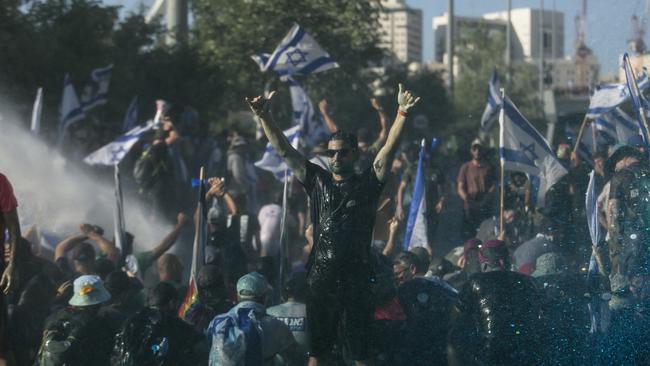
This crisis has been a long time in the making. I first visited Israel 37 years ago, in 1986. Shimon Peres was prime minister, Yitzhak Shamir foreign minister, Yitzhak Rabin defence minister, and Chaim Herzog president (the father of today’s president, Isaac Herzog). Over many visits I met and interviewed all of them, some many times.
In 1986 I interviewed Herzog, who told me he thought Israel’s biggest threat was the conflict between religious and secular Jews. This struck me as an odd view, perhaps designed to divert attention from the Palestinian problem. But Herzog, an immensely gifted man, was prescient. Today’s conflict isn’t just religious versus secular but it’s partly that.
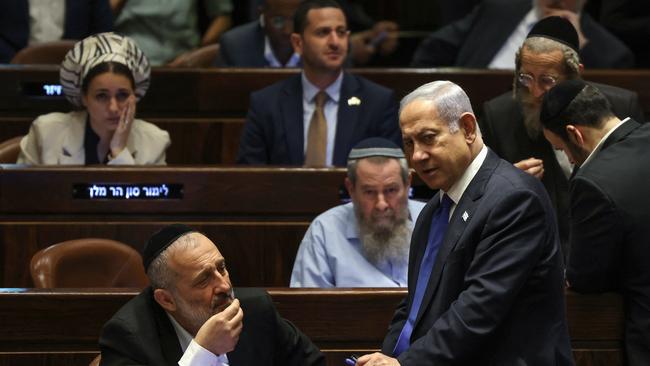
The “reasonableness” legislation is just the beginning for Netanyahu’s government. It wants to prevent the court from disallowing any legislation Israel’s parliament, the Knesset, passes unless it contradicts the nation’s Basic Laws. It also wants to prevent the court vetoing cabinet appointments or reversing administrative decisions by individual cabinet ministers. Most important, it wants to give government much greater say in appointing judges. It also wants to reduce the customary independence enjoyed by the attorney-general.
There’s a strong case for each of these reforms. Enacting them would bring Israel closer to Australian legal and administrative practice. But there’s also a strong case against them. This arises out of Israel’s distinctive constitutional arrangements. Unlike Australia and the US, but similar to Britain and New Zealand, Israel doesn’t have a written constitution. Nor does it have a senate or any upper house, or federal states.
Therefore the court is the only check or restraint or balance on any government that commands majority support in the Knesset.
But the court has become increasingly politicised. Its critics view it as arrogant and ideological, committed to a left-liberal and secular view of Israel. The court dreamed up all by itself the idea of disallowing legislation because it’s “unreasonable”. It decided it could annul any appointment of a cabinet minister, or reverse any cabinet decision or minister’s decision, in fact compel more or less any level of any government to desist from any action at all. The court thus became a kind of second government of Israel, taking decisions that would normally be taken by democratically elected governments.
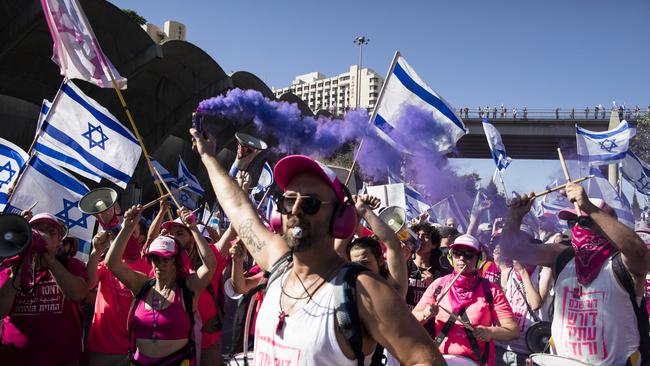
Opponents of the new laws have, ironically, appealed them to the court they are meant to reform.
Neither side, so far, is willing to compromise meaningfully.
What has come together is a perfect storm of structural and demographic factors, coinciding with the happenstance of personality and desperately narrow electoral majorities. The majestic achievement, perilous drama and sense now of potential tragedy that confront Israel are an expression of similar factors in the global Jewish community. Though the Jewish tradition is one of the most sublime, profound and influential in all human history, there are today only 16 million Jews in all the world. Nearly half of them live in Israel.
The modern Zionist movement that founded Israel was not essentially religious. After centuries of persecution in Europe, Jewish leaders determined to return to their historic homeland and found a free Jewish society where they would never be put to death, enslaved or persecuted again. This Zionism was in some senses anti-religious. It honoured Jewish tradition, but it was concerned with taking secular control of life.
It was profoundly influenced by socialism. The early kibbutz movement, of nearly self-sufficient working communes, is perhaps the only time in history when a version of socialism worked.
Israel is the land of limitless impossibilities. That such an impoverished group of people could build a nation, and in time it would become rich, powerful and successful, is miraculous. But over time four great divisions would evolve in Israel. Each represented not a binary but a continuum.
One was the region of origin. The first modern Zionists were Europeans. But after Israel achieved its independence in 1948, Arab nations intensified a long tradition of persecution of their once substantial Jewish populations. Hundreds of thousands of Jews from Arab and North African lands came to Israel. Later they were supplemented by millions of Russian Jews.
The second big division emerged after the Arab-Israeli war of 1967. Israel was attacked by a swarm of Arab armies, in defiance of the UN resolution that guaranteed its independence, in 1948. For decades afterwards it faced a relentless series of attacks, wars and threats of war. In the Six-Day War in 1967 Israel as usual faced a coalition of Arab nations. Nonetheless, it won the war and occupied the West Bank, the Gaza Strip, the Sinai Desert and the Golan Heights. All these territories made Israel more strategically defensible.
For decades after 1967, the Israeli consensus was it would hand over these territories to Arab neighbours in exchange for peace. That’s what happened with the Sinai in 1979, when Israel and Egypt made peace.
In all the territories Israel seized, communities of Jewish Israelis settled. The land was cheap and these communities bolstered Israel’s physical security. Such settlements were uprooted when Israel got out of Sinai and later Gaza.
Israeli prime ministers Rabin, Ehud Barak and Ehud Olmert made generous peace offers of land for a Palestinian state. These offers embraced all of the Gaza Strip and more than 90 per cent of the West Bank, with only the key Jewish settlements retained by Israel. And that would be compensated by land from Israel proper.
But by the 1970s the Palestinian leadership had become ideologically anti-Israel and pro-terrorist. It dreamed of occupying all the land of Israel. It made absurd demands, such as that every descendant of every Palestinian should be allowed to live forever in Israel itself, not just the new state based on West Bank and Gaza. It would never commit to an agreement constituting an end of all its claims on Israel. Nor could it ever convincingly argue it would stop terror attacks. Any Palestinian leader making peace would have faced a death sentence at the hands of Palestinian extremists.
This long failure of the peace process had difficult effects on Israeli politics. Leaving aside East Jerusalem, which Israel formally annexed, hundreds of thousands of Jewish settlers moved into the West Bank for three main motives. One was economic. The land and apartments were much cheaper than in Israel proper. One was security; they could defend Israel more effectively from the territories. And one was religious-Zionist; they would claim all the biblical lands of Israel.
These hundreds of thousands of settlers, plus Israelis in East Jerusalem, became important in politics. Apart from the ultra-Orthodox among them, they served enthusiastically in the army. They were fiercely patriotic. The international community condemned them, often claiming the occupation was illegal, though the West Bank, technically, is disputed territory, the last clear sovereignty being exercised by the Ottoman Turks.
Many settlers came to believe none of the territory should ever be given to a Palestinian state. Liberal Israelis still dreamed of a two-state peace deal. They blamed settlers for much international hostility to Israel. So two-staters versus annexationists became another big internal conflict.
The settlers also exacerbated the third big division, between religious and secular Jews. Israel has a population of about 10 million. A little over 20 per cent are Arabs, who are Israeli citizens with full civic rights. A couple of per cent are Christians. The rest are Jewish.
The Arab birthrate in Israel is about three children per female. Among Jews it’s slightly lower. Among Jewish Israelis other than the ultra-Orthodox it’s about 2.5; among the ultra-Orthodox it’s nearly seven. Politically, demography is destiny. The ultra-Orthodox make up 11 to 13 per cent of Israel’s population. By 2050 they could be a quarter of Israel and a third of the Jewish population.
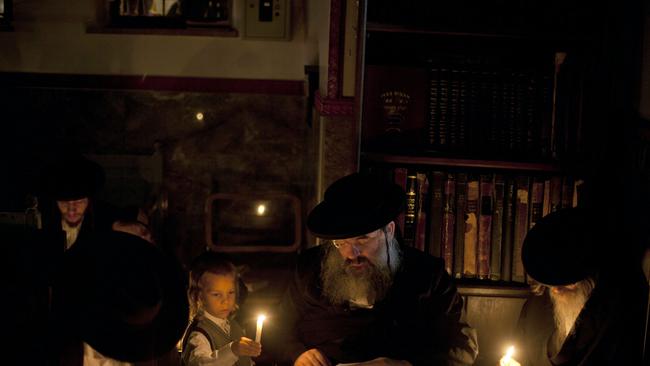
No one should demonise ultra-Orthodox Jews. I’ve visited such communities in the West Bank and found them to be humane societies of great warmth, of depth and learning, within the boundaries of their religious study. Their existence, after the Holocaust and everything else, is miraculous in itself. But one long-term problem is that they won’t serve in the army and don’t want to participate in the modern economy. At a certain point, their schools stop teaching secular subjects such as mathematics and concentrate on religious studies. The ultra-Orthodox argue this is their vocation; they give Israel its Jewish identity. They seek and receive state financial subsidies. When they were 2 per cent of the population, Israel could afford this financially and put up with it, even feel a little proud of it, politically.
Now, other Israelis resent the notionally temporary but in effect permanent exemption from the army. A recent joke has it that in Israel one-third of the country works, one-third pays taxes and one-third serves in the army. The problem is, it’s all the same third.
The ultra-Orthodox want a permanent exemption from the army. The Supreme Court has refused this in the past, arguing it means discriminating among Jewish Israelis in civic obligations.
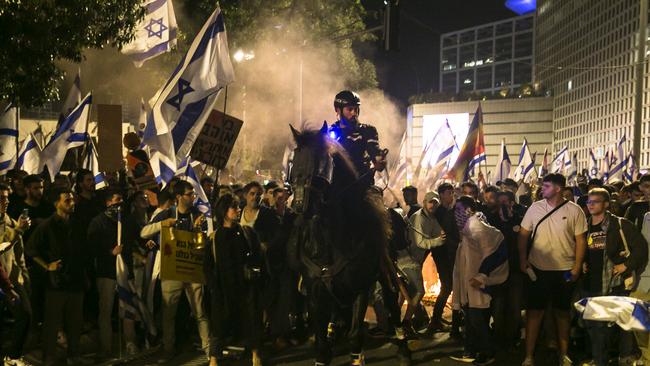
With other religious groups, the ultra-Orthodox also want to enforce some of their norms on the broader society. They are particularly effective in deciding who is officially declared a Jew. Secular Israelis frequently vote against these communal privileges at elections but the issue is never resolved. The huge Russian population, nationalist and conservative in many ways, also does not qualify for full, official Jewish status under ultra-Orthodox rulings.
The religious composition of Israel’s Jewish population is complex and diverse. More than 40 per cent self-identify as secular. Many proud Jews who revere their tradition don’t believe in God at all but do believe in Israel. Nearly 20 per cent identify as traditional, 14 per cent as traditional-religious, 11 per cent as religious and a slightly larger percentage as ultra-Orthodox. That spectrum of religious views is also a spectrum of world views.
Finally, there is the fourth division, that between the “start-up nation” with its hi-tech wizardry, as opposed to the nation of religious scholars, traditional values and almost tribal communities. Not all the start-up folks are liberal politically, some are conservative. But mostly they are engaged with the international commercial world.
So here are the contradictions between the contending Israels: the religious versus the secular; the settlers, many of whom want to annex the West Bank, versus those who think that’s too dangerous internationally and still hope there might be a two-state peace agreement one day; the liberal and affluent Europeans Jews versus the more working-class nationalist Middle East and African origin Jews versus the still distinctive Russian Jews; the start-up liberal nation versus the conservative communal nation.
On all these issues, conservative Israelis see the Supreme Court as standing unequivocally with liberal Israel against conservative Israel. Another way of looking at it is that the court has long defended Israel’s social consensus, which was for decades liberal. But all the trends outlined above mean Israel is now much more conservative. While democratic politics reflects such changes, the self-replicating court doesn’t.
Liberal Israelis are determined to hang on to the court to enforce their preferred norms; conservative Israelis are determined to use their growing electoral clout to make the official norms reflect the new society. Demographics have moved Israeli politics to the right while the court has moved to the left.
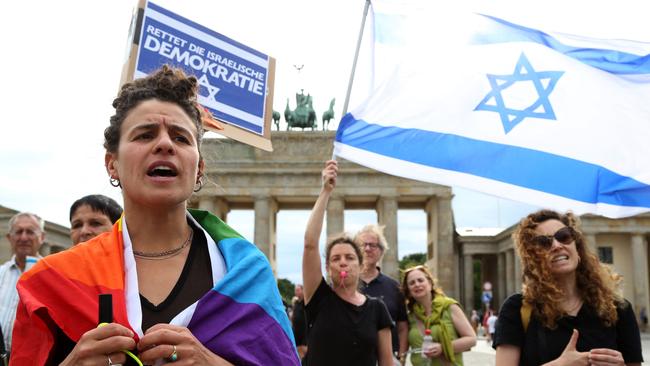
There must surely be a compromise: codification and limitation of the court’s power but not such radical and instant change. Perhaps other checks and balances could be introduced, super majorities required for the Knesset, to ignore the court, continuing ability for the court to review legislation but not personnel appointments.
The situation is infinitely complicated by Netanyahu’s personal situation, seemingly forever under legal threat of corruption charges that seem to concern mostly trivial matters and are never resolved.
According to history, the Jews of first century Jerusalem fought each other furiously as Roman soldiers gathered outside the city before destroying the Jewish kingdom and the Second Temple. No one would predict such an apocalypse today. But with the Knesset’s summer recess approaching, Israelis must rediscover an ability to compromise or they put their whole, still magnificent, society in mortal danger.




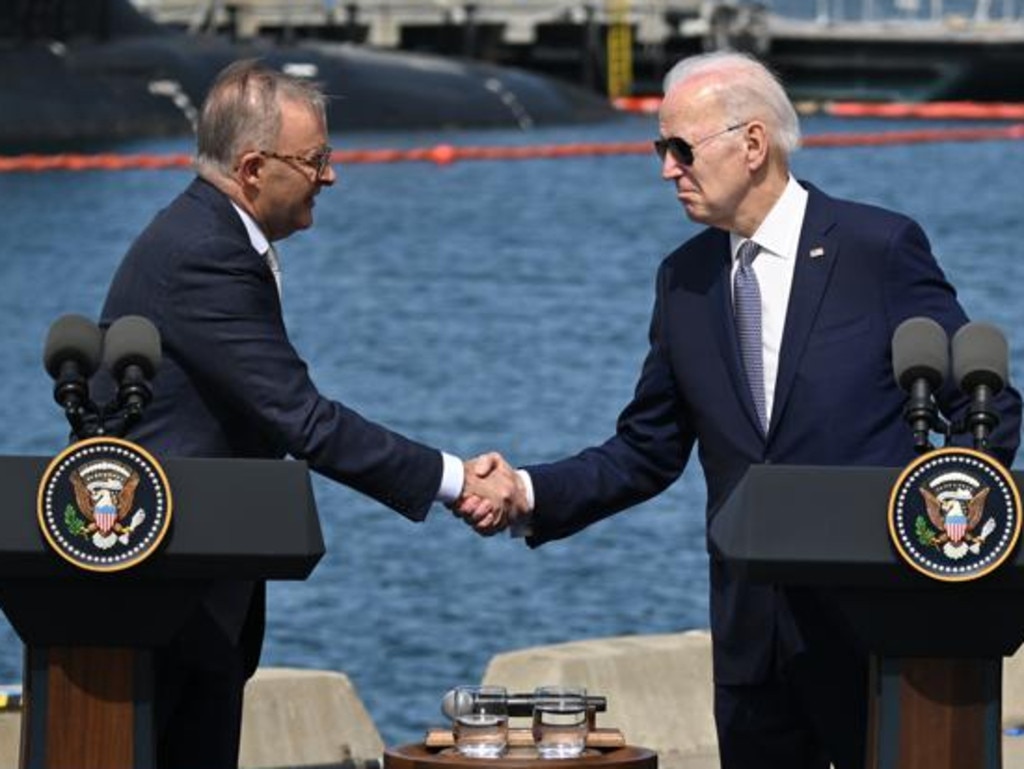


Today, Israel is embracing a season of tragedy, of almost unimaginable poignancy. The worst element is that this is a self-inflicted wound. Israel seems to be tearing itself apart, not through the actions of marginalised extremists but through the clash of contradictory Israels.